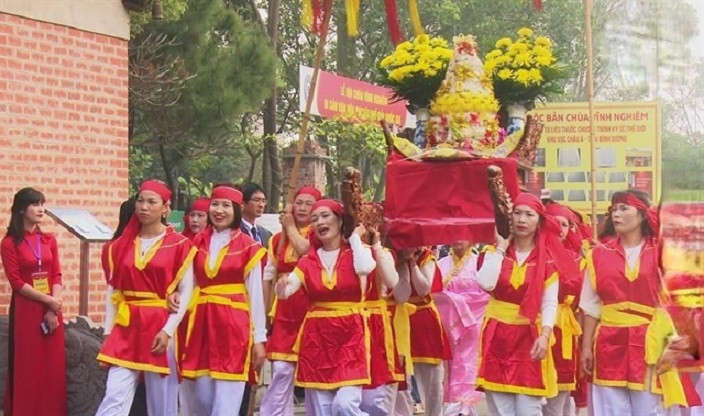
The festival, scheduled from March 21-23 (12-14 of the second lunar month) in Yên Dũng District, Bắc Giang Province, is organised by three villages La Thượng, La Trung and La Hạ, under the supervision of Trí Yên Commune People's Committee.
La Thượng villagers will prepare steamed sticky rice, flowers, fruits and incense; and decorate the festival's five-tier palanquin.
La Trung people will make use of their traditional craft of making bánh dầy (round glutinous rice cake).
Every year, the village's elderly association grows special kind of sticky rice which produce white and fragrant rice and to make bánh dầy. In addition to normal products, the villagers always produce a big one, weighing 30-40kg, and decorate it into a beautiful and delicious cake which will sit on a palanquin for the procession.
In La Hạ, villagers will take charge of making chè lam, a sweet desert made from roasted sticky rice powder, sugar and ginger.
About a month before the festival, the monks, villages' officials and the commune People's Committee meet to discuss and set up an organising committee and delegate specific tasks to take place over the three days of the festival.
In each village, there are subcommittees taking care of the affairs. All internal units such as Fatherland Front, Youth Association, Women's Association and Farmers Association will join in the effort. On the opening day, each village will hold a palanquin procession to the pagoda. Under a chief manager, young men and women will take care of carrying flags and palanquins. These carriers must be unmarried, healthy, obedient, and members of kind, exemplary families with prestige in the village.
At the scheduled time, the processions depart from the village towards the pagoda. Leading the way is the unicorn dance troupe, followed by the processions of La Thượng, La Trung and La Hạ, respectively.
The worship of ancestors will be undertaken by monks. Under the direction of the Abbot, the village elders recite Buddhist sutras.
Following the ritual ceremony is the festival activities of music and dance, and folk games like tug of war, wrestling, smashing pots and blindfolded goat catching.
Vĩnh Nghiêm Pagoda Festival is one of a largest festivals in the region, attracting huge numbers of locals, neighbouring residents and tourists.
The festival demonstrates the great influence of Buddhism in social life. It also shows the traditional ethics of Vietnamese people, and commemorates the merits of the three monks who founded the Trúc Lâm Zen, a sect with a strong identity of Vietnamese culture; and gratitude for the great contributions of the first patriarch, King - Monk Trần Nhân Tông, to expel foreign invaders in the past.
At the same time, it shows the solidarity and unity of the Vietnamese people.
Visiting the pagoda, tourists can enjoy a quiet and peaceful environment where they can calm down, relax and put aside the worries and hardships of everyday life.
They will also have opportunities to admire the beauty of the pagoda's unique artistic architectural work and a system of prominent Buddha statues that cannot be found in other pagodas.
Vĩnh Nghiêm is also home to the collection of Buddhist scriptures consisting of 3,050 engraved wooden tablets, which were honoured by UNESCO as the Documentary Heritage of Memory of the Asia-Pacific region in 2012. VNS